|
|
|
Sort Order |
|
|
|
Items / Page
|
|
|
|
|
|
|
| Srl | Item |
| 1 |
ID:
174097
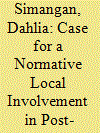

|
|
|
|
|
| Summary/Abstract |
Liberal peacebuilding’s imperfect record of involving local actors in rebuilding post-conflict societies paved the way for the local turn in peacebuilding. One of the issues the local turn highlights is local involvement in peacebuilding processes. Drawing from the experiences of previous peacebuilding missions in Cambodia, Kosovo, and Timor-Leste, this paper contributes to the local turn by identifying the types of local involvement in peacebuilding and their consequences on post-conflict societies. This identification could be useful in steering the local turn away from the same flawed local involvement that brought liberal peacebuilding into crisis. The analysis in this paper demonstrates how exclusive, superficial, non-representative, and politicized types of local involvement failed to achieve or sustain peace in Cambodia, Kosovo, and Timor-Leste. The conflict-promoting tendencies of these types of local involvement make a case for a normative agenda that is inclusive, substantive, representative, and transformative.
|
|
|
|
|
|
|
|
|
|
|
|
|
|
|
|
| 2 |
ID:
165126


|
|
|
|
|
| Summary/Abstract |
This paper examines mine action in Cambodia and its implications for common conceptions of civil society and transitional justice. The complexities of past Cambodian conflicts and the strained state-civil society relationship at present have led to a complicated legacy of landmines. The collective harm Cambodian people have experienced also blurs the line between victimhood and perpetration of crime, further complicating transitional justice in the Cambodian context. Exploring the link between mine action and transitional justice in Cambodia reveals that civil society organisations involved in mine action are not separate from the state contrary to the common conceptualisation of civil society as autonomous. It also demonstrates that mine action is responding to more complex elements of Cambodian conflicts than the retributive model of transitional justice. The participatory approaches to mine action highlight local agency and active involvement, which are crucial in creating a civil society that encourages an empowered citizenry.
|
|
|
|
|
|
|
|
|
|
|
|
|
|
|
|
| 3 |
ID:
170412
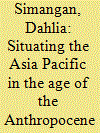

|
|
|
|
|
| Summary/Abstract |
The unprecedented and unsustainable impact of human activities on the biosphere threatens the survival of the Earth's inhabitants, including the human species. Several solutions have been presented to mitigate, or possibly undo, this looming global catastrophe. The dominant discourse, however, has a monolithic and Western-centric articulation of the causes, solutions, and challenges arising from the events of the Anthropocene which may differ from the other epistemes and geographies of the world. Drawing on the International Relations (IR) critical engagement with the Anthropocene, this paper situates the Asia-Pacific region in the Anthropocene discourse. The region’s historical and socio-ecological characteristics reveal greater vulnerability to the challenges of the Anthropocene compared to other regions while its major economies have contributed recently to the symptoms of the Anthropocene. On the other hand, the region’s ecocentric philosophies and practices could inform strategies of living in the Anthropocene. This contextualised analysis aims to offer an Asia-Pacific perspective as well as insights into the development of IR in the age of the Anthropocene.
|
|
|
|
|
|
|
|
|
|
|
|
|
|
|
|
| 4 |
ID:
163054
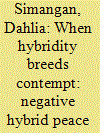

|
|
|
|
|
| Summary/Abstract |
This paper examines the unresolved tensions from international/liberal-local encounters during Cambodia’s post-conflict peacebuilding in the areas of governance and justice. The quick introduction but weak implementation of international/liberal norms and institutions enabled the local elite to contextualise, negotiate, resist and reject those international/liberal norms and institutions to preserve an elite-centred status quo. The outcome of these international/liberal-local encounters is a negative hybrid peace in which peace is neither liberal nor emancipatory. The analysis in this paper contributes to the discussion on hybridity in peacebuilding by describing the characteristics, explaining the formation process and tracing the long-term consequences of negative hybrid peace
|
|
|
|
|
|
|
|
|
|
|
|
|
|
|
|
| 5 |
ID:
176247
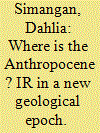

|
|
|
|
|
| Summary/Abstract |
Several disciplines outside the natural sciences, including International Relations (IR), have engaged with the Anthropocene discourse in order to theorize their relevance and translate their practical value in this new phase of the Earth's history. Some IR scholars have called for a post-humanist IR, planet politics, a cosmopolitan view, and ecological security, among other approaches, to recalibrate the theoretical foundations of the discipline, making it more attuned to the realities of the Anthropocene. Existing discussions, however, tend to universalize human experience and gravitate towards western ontologies and epistemologies of living in the Anthropocene. Within this burgeoning scholarship, how is the IR discipline engaging with the Anthropocene discourse? Although the Anthropocene has become a new theoretical landscape for the conceptual broadening of conventional IR subjects, this review reveals the need for sustained discussion that highlights the differentiated human experiences in the Anthropocene. The existing IR publications on the Anthropocene locates the non-spatial narratives of vulnerability and historical injustice, the non-modernist understanding of nature, the agency of the vulnerable, and the amplification of security issues in the Anthropocene. It is in amplifying these narratives that the IR discipline can broaden and diversify the discourse on the Anthropocene and, therefore, affirm its relevance in this new geological age.
|
|
|
|
|
|
|
|
|
|
|
|
|
|
|
|
| 6 |
ID:
180649
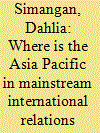

|
|
|
|
|
| Summary/Abstract |
Some scientists propose that the Earth has entered the Anthropocene—a new geological age in which human activities have become the driving force behind global environmental changes. Several disciplines outside the natural sciences have engaged with debates surrounding the Anthropocene, including International Relations (IR), in order to theorise their relevance in this new age. To pluralise this burgeoning research area and contribute to the updating of the IR discipline’s engagement with the Anthropocene discourse, this study seeks to locate and highlight the Anthropocene themes and narratives related to the Asia-Pacific region. A systematic review of the literature reveals knowledge gaps in the IR discipline’s engagement with the Asia Pacific as a unique region in the Anthropocene, encouraging a more robust analysis of regional or multi-level anthropogenic contributions, closer investigation of differentiated experiences of vulnerability, and further articulation of contextualised yet globally significant solutions to environmental threats. The mainstream scholarship needs to engage with the Asia-Pacific experience(s) in the Anthropocene considering the region’s vulnerability to the challenges of the Anthropocene and, at the same time, responsibility for increased anthropogenic factors.
|
|
|
|
|
|
|
|
|
|
|
|
|
|
|
|
|
|
|
|
|